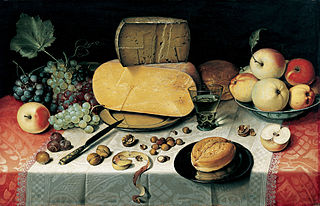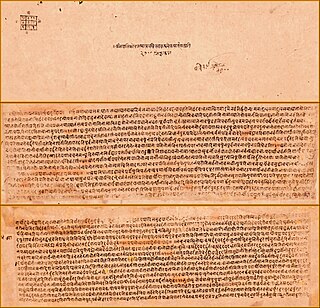In economics, factors of production, resources, or inputs are what is used in the production process to produce output—that is, finished goods and services. The utilized amounts of the various inputs determine the quantity of output according to the relationship called the production function. There are four basic resources or factors of production: land, labour, capital and entrepreneur. The factors are also frequently labeled "producer goods or services" to distinguish them from the goods or services purchased by consumers, which are frequently labeled "consumer goods".
Dogma is a belief or set of beliefs that is accepted by the members of a group without being questioned or doubted. It may be in the form of an official system of principles or doctrines of a religion, such as Roman Catholicism, Judaism, or Protestantism, as well as the positions of a philosopher or of a philosophical school such as postmodernism, egalitarianism, and dark enlightenment. It may also be found in political belief-systems, such as communism, progressivism, liberalism, conservatism, and fascism.

A legend is a genre of folklore that consists of a narrative featuring human actions, believed or perceived, both by teller and listeners, to have taken place in human history. Narratives in this genre may demonstrate human values, and possess certain qualities that give the tale verisimilitude. Legend, for its active and passive participants may include miracles. Legends may be transformed over time to keep them fresh and vital.

Dinner usually refers to what is in many Western cultures the largest and most formal meal of the day, which some Westerners eat in the midday. Historically, the largest meal used to be eaten around midday, and called dinner. In Western cultures, especially among the elite, it gradually migrated to later in the day over the 16th to 19th centuries. The word has different meanings depending on culture, and may mean a meal of any size eaten at any time of day. In particular, it is still sometimes used for a meal at noon or in the early afternoon on special occasions, such as a Christmas dinner. In hot climates, people have always tended to eat the main meal in the evening, after the temperature has fallen.

A committee or commission is a body of one or more persons subordinate to a deliberative assembly. A committee is not itself considered to be a form of assembly. Usually, the assembly sends matters into a committee as a way to explore them more fully than would be possible if the assembly itself were considering them. Committees may have different functions and their types of work differ depending on the type of the organization and its needs.
Thaumaturgy is the purported capability of a magician to work magic or other paranormal events or a saint to perform miracles. It is sometimes translated into English as wonderworking. A practitioner of thaumaturgy is a "thaumaturge", "thaumaturgist", "thaumaturgus" or "miracle worker". A saint, who is a person who is recognized as having an exceptional degree of holiness or likeness or closeness to God, may be claimed to have performed miracles, which are events not explicable by natural or scientific laws.
Yo is a slang interjection, commonly associated with North American English. It was popularized by the Italian-American community in Philadelphia, Pennsylvania, in the 1940s.
A phonemic orthography is an orthography in which the graphemes correspond to the phonemes of the language. Natural languages rarely have perfectly phonemic orthographies; a high degree of grapheme-phoneme correspondence can be expected in orthographies based on alphabetic writing systems, but they differ in how complete this correspondence is. English orthography, for example, is alphabetic but highly nonphonemic; it was once mostly phonemic during the Middle English stage, when the modern spellings originated, but spoken English changed rapidly while the orthography was much more stable, resulting in the modern nonphonemic situation. However, because of their relatively recent modernizations compared to English, the Romanian, Italian, Turkish, Spanish, Finnish, Czech, Latvian, Esperanto, Korean and Swahili orthographic systems come much closer to being consistent phonemic representations.
A boyfriend is a male friend or acquaintance, often specifying a regular male companion with whom a person is romantically or sexually involved.

Pumpernickel is a typically heavy, slightly sweet rye bread traditionally made with sourdough starter and coarsely ground rye. It is sometimes made with a combination of flour made from rye as well as whole rye grains.
Etymology is the study of the history of linguistic forms, that is the history of how words are written and pronounced, and how their spelling and pronunciation changed. By extension, the etymology of a written word means its origin and development throughout history. Etytmology deals with the forms and the past meanings, but not with the current meanings of words.

A reliquary is a container for relics. A portable reliquary may be called a fereter, and a chapel in which it is housed a feretory.
An endonym is a common, native name for a geographical place, group of people, individual person, language or dialect, meaning that it is used inside that particular place, group, or linguistic community in question; it is their self-designated name for themselves, their homeland, or their language.

A halo is a crown of light rays, circle or disk of light that surrounds a person in art. It has been used in the iconography of many religions to indicate holy or sacred figures, and has at various periods also been used in images of rulers or heroes. In the religious art of Ancient Greece, Ancient Rome, Christianity, Hinduism, Buddhism and Islam, among other religions, sacred persons may be depicted with a halo in the form of a circular glow, or flames in Asian art, around the head or around the whole body—this last one is often called a mandorla. Halos may be shown as almost any colour or combination of colours, but are most often depicted as golden, yellow or white when representing light or red when representing flames.
French names typically consist of one or multiple given names, and a surname. Usually one given name and the surname are used in a person’s daily life, with the other given names used mainly in official documents. Middle names, in the English sense, do not exist. Initials are not used to represent second or further given names.

Nirukta is one of the six ancient Vedangas, or ancillary science connected with the Vedas – the scriptures of Hinduism. Nirukta covers etymology, and is the study concerned with correct interpretation of Sanskrit words in the Vedas.
A donor in general is a person, organization or government which donates something voluntarily. The term is usually used to represent a form of pure altruism, but is sometimes used when the payment for a service is recognized by all parties as representing less than the value of the donation and that the motivation is altruistic. In business law a donor is someone who is giving the gift (law), and a donee the person receiving the gift.

A company, abbreviated as co., is a legal entity representing an association of people, whether natural, legal or a mixture of both, with a specific objective. Company members share a common purpose and unite to achieve specific, declared goals. Companies take various forms, such as:

The arts are a very wide range of human practices of creative expression, storytelling and cultural participation. They encompass multiple diverse and plural modes of thinking, doing and being, in an extremely broad range of media. Both highly dynamic and a characteristically constant feature of human life, they have developed into innovative, stylized and sometimes intricate forms. This is often achieved through sustained and deliberate study, training and/or theorizing within a particular tradition, across generations and even between civilizations. The arts are a vehicle through which human beings cultivate distinct social, cultural and individual identities, while transmitting values, impressions, judgments, ideas, visions, spiritual meanings, patterns of life and experiences across time and space.
Freedom is understood as either having the ability to act or change without constraint or to possess the power and resources to fulfill one's purposes. Freedom is often associated with liberty and autonomy in the sense of "giving oneself their own laws", and with having rights and the civil liberties with which to exercise them without undue interference by the state. Frequently discussed kinds of political freedom include freedom of assembly, freedom of association, freedom of choice, and freedom of speech.








